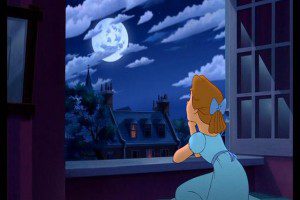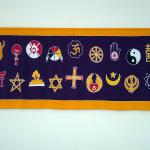 I can fly, just like Wendy, I can fly.
I can fly, just like Wendy, I can fly.
Or so I told my children growing up because Wendy is the heart and soul of Disney’s Peter Pan. Peter is not particularly likable, but Wendy does what she can.
I aspire to be like Wendy, capable of joyous childhood, but also able to grow up. I want to grow up, but not to be a codfish and Uncle Walt shows us the way.
What did Walt teach me?
Wendy is a child growing into an adult. Her father wants to rush her out of the nursery and Peter wants her to stay, but Wendy knows she will grow up in due time. This is the ideal that is so rare in this or any other time. Childhood is a good time, not the only good time. As with any good thing, certain people wish to prolong the good thing past the point when it is good. The child becomes merely childish and there are few things less attractive than the fifty-something Peter Pan. The tights alone are horrifying.
Just as bad, however, is the cultural pressure, more prevalent today than when the movie was made, to grow up too soon. Poverty forces false adulthood on children as does sin, yet surely we are the first culture ever to rush childhood for profit. This happens when kids’ games are turned into adult sport, when small children are sent to “proms,” or we hold graduations from elementary school. Children are taught to ape adult ways or are used in our politics, pulpits, or promotions as pawns in schemes to gain power.

Wendy wishes to grow up in due time, neither early or late, and her wisdom would redeem Peter, if he could listen through his pride, and does soften Father at the very the end of the film.
Pan is absurd for wanting to remain a child. He defies nature and so has lost any meaning in his play. Toys are for children and an adult may collect toys, but he can never play with them again. Walt opened Disneyland saying: Here age relives fond memories of youth. Nowadays to look at the crowd, too many of us want to be youths when we are not: childish clothing, childish manners, childish relationships. In contrast are those who can “recollect,” more than remember, and experience with nostalgia good times from childhood. This memory is especially rich when we see the pleasure in children and grandchildren.
Wendy will grow up to become a mother and grandmother and so relive those fond memories. Pan will never grow up and so never have memories of youth or heirs. He will die as he lived: a child. Death cannot be put off with eternal youth . . . only the necessary preparation for death that old age gives us. We will die, but unready. Those who die young are ready by God’s grace. Those who never grow up by choice presume on God’s grace and face the moment of death unshriven by growing up.
Of course, some adults grow twisted in another direction. They hate youth and mock it. Hook is fearful of Peter and wants revenge: he is every adult who would hasten growing up before it is time. Growing up must be, but woe to he who brings it as a fall instead of an evolution.
Mother is the center of the film because she has grownup without becoming dull. She has a grownup wonder and can be tender without being maudlin, strong without becoming fierce. Wendy returns to become like her Mother because this is the happiest way… the way that is winsome and wonderful. Father, on seeing Pan’s ship, shows he too might regain wonder if only he can go to the office without becoming officious.
We can fly, just like Wendy, we can fly, but only if we grow up, let Pan go if he must, and move forward to the Real Land where we are always children of God.















